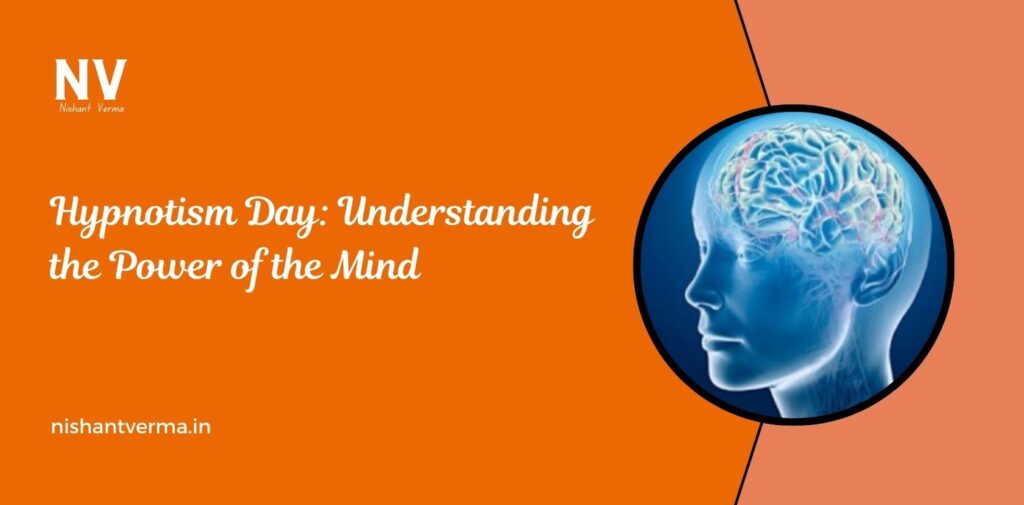Every year, on January 4th, people around the world celebrate Hypnotism Day. It’s a day dedicated to spreading awareness about the fascinating world of hypnosis and its potential benefits. While many people have heard of hypnosis through movies or shows, it’s often misunderstood. Hypnotism is a powerful tool used to help people in many areas of life, from health to personal development. In this article, we will explore what hypnotism is, how it works, and how it can be beneficial in our lives.
What is Hypnotism?
Hypnotism, also known as hypnosis, is a state of focused attention, deep relaxation, and heightened suggestibility. It’s often compared to the feeling of daydreaming or being “lost” in a book or movie. When a person is under hypnosis, they are deeply relaxed but still aware of their surroundings. In this state, they are more open to suggestions, which can be used to help them make positive changes in their lives.
Hypnotism is different from what we see in movies where people are made to do strange things against their will. In reality, hypnosis is a safe and voluntary process, where the person being hypnotized is in control at all times. It is a natural state of mind that can be achieved through relaxation techniques, focus, and guidance from a trained professional.

How Does Hypnotism Work?
When a person is hypnotized, their mind enters a state of heightened concentration. This state of mind is often referred to as trance. During this trance, the person is more focused on their inner thoughts and less distracted by the outside world. Hypnotists use gentle guidance, relaxation, and calming words to help the person relax deeply and enter this state of mind.
Once the person is in a trance, the hypnotist may give positive suggestions to help with certain issues, such as quitting smoking, managing stress, or overcoming fears. These suggestions can have a lasting effect, as the subconscious mind is more receptive to change during hypnosis. It is important to note that a person cannot be hypnotized to do something against their will or values.
Benefits of Hypnotism
Hypnotism has been found to be helpful in various areas of life, from personal well-being to medical treatment. Here are some of the benefits of hypnosis:
- Stress and Anxiety Relief: One of the most common reasons people turn to hypnosis is to manage stress and anxiety. In today’s fast-paced world, many people struggle with stress from work, family, and daily life. Hypnosis can help calm the mind, relax the body, and reduce feelings of anxiety. It promotes a sense of inner peace and balance, which can help people handle stress in a healthier way.
- Overcoming Bad Habits: Hypnosis is often used to help people break bad habits such as smoking, overeating, or nail-biting. By addressing the subconscious mind, hypnosis can make it easier for people to change negative behavior patterns. For example, a person who is trying to quit smoking might be given suggestions to replace the desire for cigarettes with healthier habits, such as exercise or drinking water.
- Pain Management: Hypnosis has also been used to help manage chronic pain. People suffering from conditions like arthritis, headaches, or fibromyalgia have reported relief after undergoing hypnotherapy. Hypnosis works by helping the mind focus on something other than the pain, which can reduce the sensation of discomfort and improve overall quality of life.
- Improving Sleep: Many people suffer from insomnia or poor sleep quality. Hypnosis can help promote better sleep by relaxing the body and calming the mind. Hypnotists can use techniques to help individuals achieve deeper, more restful sleep, making it easier to fall asleep and stay asleep throughout the night.
- Enhancing Focus and Performance: Hypnotism is not only helpful for managing health issues but can also enhance mental focus and performance. Athletes, students, and professionals sometimes use hypnosis to improve their concentration, memory, and performance. By focusing the mind and eliminating distractions, hypnosis can help individuals achieve their goals more effectively.

Hypnosis in Indian Culture
In India, hypnosis has a long history and is often tied to ancient practices such as meditation and yoga. These practices have always emphasized the power of the mind and the importance of controlling thoughts and emotions. Hypnosis is seen as a way to tap into the subconscious mind, similar to how meditation helps individuals focus on their inner self.
In recent years, the popularity of hypnotherapy in India has grown, with many people turning to it for various purposes, such as stress management, smoking cessation, and even overcoming phobias. There are now many trained and certified hypnotherapists in India who help people through the process of hypnosis.
Hypnotism Day: Why is it Important?
Hypnotism Day is important because it helps break the myths and misconceptions surrounding hypnosis. It provides an opportunity to educate people about how hypnosis works and how it can be used to improve health and well-being. Many people fear hypnosis because of how it’s portrayed in movies and television. However, it is important to understand that hypnosis is a safe and natural process that can bring about positive changes in one’s life.
This day also helps raise awareness about the role of hypnotherapists, who are trained professionals that guide individuals through the process of hypnosis. Hypnotherapists play a key role in helping people achieve their goals, whether it’s managing stress, overcoming bad habits, or improving mental performance.

How Can You Celebrate Hypnotism Day?
While Hypnotism Day is not widely celebrated in India, it’s a great opportunity to learn more about hypnosis and its benefits. Here are some ways to celebrate the day:
- Learn About Hypnosis: Take some time to read about hypnosis, its history, and how it works. You can watch documentaries, read books, or browse online resources to understand the science behind it. Understanding the real power of hypnosis can help you appreciate its potential.
- Try Relaxation Techniques: Even if you are not interested in formal hypnotherapy, you can try simple relaxation techniques at home. Deep breathing, guided meditation, or focusing on positive affirmations can help you experience a state of relaxation similar to hypnosis.
- Consult a Hypnotherapist: If you’re curious about how hypnosis can help you with specific issues, such as anxiety, stress, or quitting smoking, you can consider consulting a certified hypnotherapist. Many hypnotherapists offer consultations and can help guide you through the process in a safe and supportive environment.
Conclusion
Hypnotism is a powerful tool that can help people improve their mental and physical health. Whether it’s reducing stress, overcoming bad habits, managing pain, or enhancing focus, hypnosis has proven to be beneficial in many areas of life. Hypnotism Day serves as a reminder to understand and appreciate the power of the mind, and it offers an opportunity to explore how hypnosis can be used for positive change. So, on January 4th, take a moment to learn more about hypnotism and how it can help improve your life.




